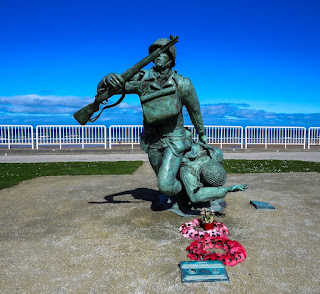Veterans Day: "Some gave all, all gave some."
 |
| Source |
War has shaken the world and mankind, innumerable times, so it is no surprise that Veterans Day coincides with other nations' Armistice Day and Remembrance Day, as well as being the anniversary of the end of World War I. And I use the word SHAKEN, deliberately.
I will never forget my vigiling experiences at the deathbeds of some veterans, who shake in their final hours. Agitation is a common occurrence in the labor of dying; Barbara Karnes, RN notes that "restlessness can be from a lack of oxygen but more than likely it is fear." Support is frequently dispensed with medication, comfort care and calming words. But when a dying veteran experiences agitation, we can and should offer specialized support.
| Scott Field, IL circa.1942. Library of Congress |
Discharged from duty
This summer, along with other hospice volunteers, I attended the Hospice Foundation of America video program, "Improving Care for Veterans Facing Illness and Death." It is important to recognize that not all veterans carry "emotional baggage" or bear a stoic, "battle ready" sensibility. Your patient or loved one's branch of service, rank, and job(s) may or may not impact their unconscious mind. One of the program panelists, Deborah Grassman, ARNP, shared great insights from her career as a hospice nurse at the Department of Veterans Affairs. I encourage readers to follow this link to Grassman's excellent essay, Wounded Warriors: Their Last Battle. She includes a long list of questions suited to end of life counseling when it seems necessary to discharge the veteran from the troubling demons of unfinished duty or guilt. But Grassman cautions professionals and companions:"don't keep pushing; plant a seed."
 |
| "Golden Wings" by Suzy St. John |
Bedside basics
Some of the best bedside skills during an end of life vigil revolve around silence--though soothing or "favorite" music is appropriate at times; calmness in the room and gentle touch also promote a peaceful death. But when the person you are companioning is struggling with agitation (symptoms may include shaking, thrashing, groans or other distressed vocalizations,) beneficial intervention can go beyond medical options.- If your loved one is conscious, gently ask him or her to share a thought or feeling.
- Showing one or two service-era photos can prompt expression.
- Symbols touch and access our deepest selves; this is true even when dementia is present. Expressing gratitude and recognition of service through the use of ceremony and symbol is significant.
- A hospice or veterans organization may be able to conduct a brief Honors presentation "on behalf of a grateful nation." But don't hesitate to step up with your own veteran tribute: say a few words, play a patriotic or branch-of-service song, and attach a flag pin to their shirt.
- Often, as death nears (this could be days, hours or minutes) the person is unconscious or 'nonresponsive' (despite movement or talking) and yet, these bedside basics can have a profound impact. I would encourage the Honors tribute even at this stage because the sense of hearing is still active.
- One of the most powerful interventions for agitation, advocated by Deborah Grassman, is the Hand-Heart-Connection:
- Put your hand on the person's chest,
- take their hand and hold it on your chest,
- breathe calmly and deeply.
"We are called to be strong companions and clear mirrors to one another, to seek those who reflect with compassion and a keen eye how we are doing, whether we seem centered or off course ... we need the nourishing company of others to create the circle needed for growth, freedom and healing."
- Wayne MullerThank you for caring!
Read more about my vigiling experience in Silent Night Holy Night: Sacred Dying is another reason to write condolence

.jpg)



